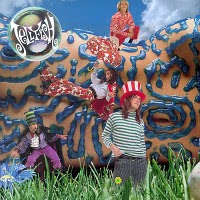 From The Beatles right through to the likes of The Lightning Seeds, Britain has a knack of producing bands who deliver a brand of pure, polished pop. The content may have dark or serious overtones but the melody and vocals carry a rare, unblemished character. When a band is lauded as new pop sensations in America don’t expect the same characteristics. In some respects our pop is their AOR whilst their pop arrives way over from left field. They Might Be Giants and Eels are good illustrations of this idiosyncrasy and Jellyfish can be added to that list. They may have more rounded edges than the others but, underneath, they are equally strange. Vocally the closest comparison to Jellyfish is Crowded House (Andy Sturmer even sounds like Neil Finn), but when it comes to lyrical content they are a mile apart. Absent fathers (“The Man I Used To Be”), prostitution (“The King Is Half Undressed”), marital abuse (“She Still Loves Him”), rampant consumerism and parental neglect (“All I Want Is Everything”) are all covered. It’s testimony to the skill of the band that, no matter how heavy the subject, the music retains a lightness of touch to stop proceedings becoming too maudlin. Special mention should also be given to “I Wanna Stay Home” and “Baby’s Coming Back” which, on their own, prove that Jellyfish was definitely a band that got away. –Ian
From The Beatles right through to the likes of The Lightning Seeds, Britain has a knack of producing bands who deliver a brand of pure, polished pop. The content may have dark or serious overtones but the melody and vocals carry a rare, unblemished character. When a band is lauded as new pop sensations in America don’t expect the same characteristics. In some respects our pop is their AOR whilst their pop arrives way over from left field. They Might Be Giants and Eels are good illustrations of this idiosyncrasy and Jellyfish can be added to that list. They may have more rounded edges than the others but, underneath, they are equally strange. Vocally the closest comparison to Jellyfish is Crowded House (Andy Sturmer even sounds like Neil Finn), but when it comes to lyrical content they are a mile apart. Absent fathers (“The Man I Used To Be”), prostitution (“The King Is Half Undressed”), marital abuse (“She Still Loves Him”), rampant consumerism and parental neglect (“All I Want Is Everything”) are all covered. It’s testimony to the skill of the band that, no matter how heavy the subject, the music retains a lightness of touch to stop proceedings becoming too maudlin. Special mention should also be given to “I Wanna Stay Home” and “Baby’s Coming Back” which, on their own, prove that Jellyfish was definitely a band that got away. –Ian
Rock
Automatic Man “Automatic Man” (1976)
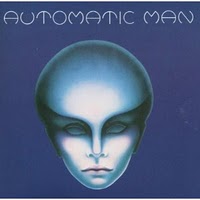 There he is again. That Blue Space Alien staring out, empty-eyed from my LP collection. As if using telepathy, he beckons me to reach out for him, pull out his vinyl body and put him my turntable. It’s funny how after all these years since I first saw him in the record bins at Peaches Records in Ohio, he still has that effect on me. But I know the real lure of this LP is not the Alien, but the Space-Fusion Prog of the band, that brings me back to play that album. Automatic Man’s debut LP, in my opinion is on the best of the fusion/prog era, perhaps equaling Return To Forever’s classic Romantic Warrior.
There he is again. That Blue Space Alien staring out, empty-eyed from my LP collection. As if using telepathy, he beckons me to reach out for him, pull out his vinyl body and put him my turntable. It’s funny how after all these years since I first saw him in the record bins at Peaches Records in Ohio, he still has that effect on me. But I know the real lure of this LP is not the Alien, but the Space-Fusion Prog of the band, that brings me back to play that album. Automatic Man’s debut LP, in my opinion is on the best of the fusion/prog era, perhaps equaling Return To Forever’s classic Romantic Warrior.
Automatic Man was a super-group of sorts. The self-titled debut album featured a stellar lineup: Keyboard player and singer Bayete, whose voice eerily resembles Jimi Hendrix, played with Stanley Clark. S.F. Bay area musician Doni Harvey, ex-Gong, played bass. Pat Thrall, was a member of Stomu Yamashita’s band Go, was on guitar. Formerly of Santana, legendary percussionist Michael Shrieve blazed on drums.
This isn’t a loose jam session or self-indulgent doodling, this is an album driven by strong songwriting. The opening “Atlantis Rising/Comin’Through” displays a sound that manages to keep its footings firmly in the here and now, whilst simultaneously oozing an air of futuristic soundscapes that render it ripe for evoking mental imagery. Power number “My Pearl”, with its driving funk/synth vibe, demonstrate that Automatic Man had the chops to craft a pop single. Pat Thrall’s riffs even give you the impression that Hendrix has been transported back from the dead to appear, or even cloned! You got to check out Thrall’s the guitar solo on the title track. It’s got to be the best solo that no one has ever heard! The lush keyboard arrangements add a reverberating layer of an almost alien-like displacement to the overall sound of the proceedings. Meanwhile, breezier numbers such as “One ‘N One” and “Newspapers” exhibit a more other-worldly, cold sound, as if lying on a beach on Pluto (does Pluto have beaches?)
Space references aside, this album really rocks. There is no filler on this LP and is truly a satisfying listen. If you see the Blue Alien, let him beam you aboard for the ride. –Ed
Mike Oldfield “Tubular” Bells (1973)
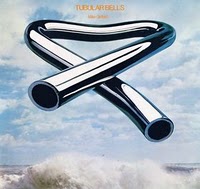 It’s difficult to asess the importance of “Tubular Bells” and indeed the career of Mike Oldfield without reference to two important figures who contributed to the success of the album, Richard Branson and William Friedkin. The 19 year old Oldfield had used valuable studio time funded by Branson, to record his debut, then titled “Opus 1”. Oldfield then hawked this work around the major record companies to complete rejection, and Branson, who at that time ran a mail order company, decided to form his own record company (Virgin), and release this (retitled “Tubular Bells”) as the inaugural record. William Friedkin was at this time Directing the ground breaking horror flick “The Exorcist”, and having heard “Tubular Bells” decided to use the opening eerie tinkling piano intro, decided to use it as the title music for the movie. And so, the die was cast and the album would go on to sell sixteen million copies worldwide, win Oldfield a Grammy award, and develop a new genre of music. It’s difficult to review “Tubular Bells” as a straight Popular, Classical or Rock recording. It contains all of these genres and more, classically structured, it’s a complex, startlingly unique, and undoubtedly valiant recording. At times the sound is beautifully symphonic, at other times hauntingly powerful. Oldfield uses over thirty different musical instruments and probably just as many percussive instruments, to create a plethora of differing interludes, some gentle, some sonically robust, all linked together by intricate tempo changes perfectly exemplified about twelve minutes into side one where a delicately intricate section is cleverly interrupted by rifferama guitar crash chords which fade into the next musical excursion. The album finishes with a traditional English folk tune which perfectly concludes a divinely satisfying album. Some Oldfield fans argue that “Hergest Ridge” and “Ommadawn” are better musical performances, but I stoutly defend “Tubular Bells” because of its bravery, complexity and utter originality. “Tubular Bells” remains a colossal achievement. –Ben H
It’s difficult to asess the importance of “Tubular Bells” and indeed the career of Mike Oldfield without reference to two important figures who contributed to the success of the album, Richard Branson and William Friedkin. The 19 year old Oldfield had used valuable studio time funded by Branson, to record his debut, then titled “Opus 1”. Oldfield then hawked this work around the major record companies to complete rejection, and Branson, who at that time ran a mail order company, decided to form his own record company (Virgin), and release this (retitled “Tubular Bells”) as the inaugural record. William Friedkin was at this time Directing the ground breaking horror flick “The Exorcist”, and having heard “Tubular Bells” decided to use the opening eerie tinkling piano intro, decided to use it as the title music for the movie. And so, the die was cast and the album would go on to sell sixteen million copies worldwide, win Oldfield a Grammy award, and develop a new genre of music. It’s difficult to review “Tubular Bells” as a straight Popular, Classical or Rock recording. It contains all of these genres and more, classically structured, it’s a complex, startlingly unique, and undoubtedly valiant recording. At times the sound is beautifully symphonic, at other times hauntingly powerful. Oldfield uses over thirty different musical instruments and probably just as many percussive instruments, to create a plethora of differing interludes, some gentle, some sonically robust, all linked together by intricate tempo changes perfectly exemplified about twelve minutes into side one where a delicately intricate section is cleverly interrupted by rifferama guitar crash chords which fade into the next musical excursion. The album finishes with a traditional English folk tune which perfectly concludes a divinely satisfying album. Some Oldfield fans argue that “Hergest Ridge” and “Ommadawn” are better musical performances, but I stoutly defend “Tubular Bells” because of its bravery, complexity and utter originality. “Tubular Bells” remains a colossal achievement. –Ben H
Devo “Are We Not Men?” (1978)
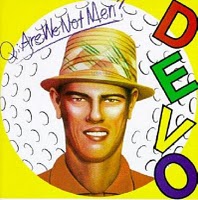 Imagine the scene. The house lights dim on an expectant crowd. It’s difficult to see through the darkness but the swish of heavy fabric announces the stage curtains being drawn back. The spots slowly rise on a stage shrouded in a huge sheet of black plastic which rises to cover the vague shape of a drum-kit. A bright beam of white light picks out movement from under the sheet and flashes off a number of blades which pierce the plastic and slash vicious tears into the black skin. Like a sci-fi caesarean Devo push themselves through, clutching instruments and dressed in vivid yellow boiler suits. It takes a little time to rip the sheet away from the drums before they launch into “Uncontrollable Urge”, but it’s still got to be one of the best entrances ever.
Imagine the scene. The house lights dim on an expectant crowd. It’s difficult to see through the darkness but the swish of heavy fabric announces the stage curtains being drawn back. The spots slowly rise on a stage shrouded in a huge sheet of black plastic which rises to cover the vague shape of a drum-kit. A bright beam of white light picks out movement from under the sheet and flashes off a number of blades which pierce the plastic and slash vicious tears into the black skin. Like a sci-fi caesarean Devo push themselves through, clutching instruments and dressed in vivid yellow boiler suits. It takes a little time to rip the sheet away from the drums before they launch into “Uncontrollable Urge”, but it’s still got to be one of the best entrances ever.
Far more guitar-led than their later releases, Are We Not Men? Was considered radical upon its release in 1978. Much closer to the punk revolution than is realised, Devo savaged the American materialistic way of life and dared to suggest that humankind was de-evolving. From sex related psycho-babble (“Uncontrollable Urge”) to satellites falling from the sky (“Space Junk”), from consumerism (“Too Much Paranoias”) to genetics (“Mongoloid”), this is a very strange and, on one plain, deeply disturbing album. It remains a powerful indictment of the human condition. –Ian
Montrose “Montrose” (1973)
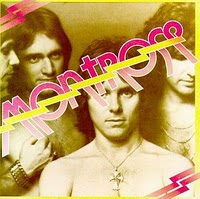 Arguably the greatest American hard rock album ever, Montrose’s 1973 debut is a stunning display of instrumental and vocal prowess. As the prototypical 4-piece – guitar/vocals/bass/drums – they recorded one of the all-time essential slabs of heavy rock. Ronnie Montrose makes a tremendous leap from in-demand session musician to bandleader and legit guitar hero, Sam Hagar (wasn’t even Sammy yet) sets the standard for American rock vocals, Bill “the Electric” Church lays down some amazingly fat basslines, and Denny Carmassi smacks his drums with intense precision and manly vigor.
Arguably the greatest American hard rock album ever, Montrose’s 1973 debut is a stunning display of instrumental and vocal prowess. As the prototypical 4-piece – guitar/vocals/bass/drums – they recorded one of the all-time essential slabs of heavy rock. Ronnie Montrose makes a tremendous leap from in-demand session musician to bandleader and legit guitar hero, Sam Hagar (wasn’t even Sammy yet) sets the standard for American rock vocals, Bill “the Electric” Church lays down some amazingly fat basslines, and Denny Carmassi smacks his drums with intense precision and manly vigor.
Montrose is a truly groundbreaking album, wildly influential on future generations of hard rock and metal bands. Incredibly tight, musically exciting, with relatively short songs (for the era) Montrose forged a new, bracingly kinetic sound, fresher than the competition. Eschewing the lengthy jamming of Led Zeppelin or Deep Purple, much less crushingly heavy than Black Sabbath, not needing the theatricality of Alice Cooper or Kiss or Queen, more talented and less over-reaching than Grand Funk, tighter than BTO or The Amboy Dukes, less overtly boogie/blues oriented and more streamlined than Foghat or the James Gang, less ponderous than Rush or Uriah Heep, less myopic than Mahoghany Rush, not at all scary like early BOC, more catchy than Cactus or Crow, harder rocking than the southern rock bands. Note: I honestly adore all (well, most) of the above-mentioned bands, I’m just using them for contrast.
Sammy Hager and Ronnie Montrose managed one more album together (1974’s fine Paper Money) before collapsing under the weight of the two competing gigantic egos, but the debut album is the real classic. Montrose has always had a permanent high spot on my top-ten “desert island disc” list. At least three songs on this album still make frequent rotation on most hard rock and classic rock stations, at least on the West Coast. Both Hagar and Ronnie Montrose admit it was a career peak. Say, how about a reunion album and tour while we’re dreaming? Crank it on up! —Darerock
Silver Apples “Silver Apples” (1968)
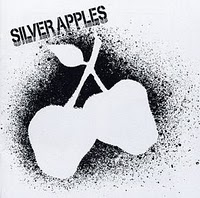 Considering that this kind of music was released in 1968 is amazing, but even more amazing is that it still kicks the ass of every other electro-pop-band, save perhaps Kraftwerk. The oscillators flow wildly, the drums lay mindnumbing beats and the lyrics, maybe hippie-esque considering the day, somehow seem ageless still. And it’s unbelievably catchy, like in a pop way. I could tell a funny tale about Syd Barrett finding a Close Encounters of the Third Kind-style alien mothership wrecked somewhere in the forest and going all circuit breaking on the mushrooms, but I won’t. Pioneering and reigning still. All hail the whirly-bird! –Tuukka
Considering that this kind of music was released in 1968 is amazing, but even more amazing is that it still kicks the ass of every other electro-pop-band, save perhaps Kraftwerk. The oscillators flow wildly, the drums lay mindnumbing beats and the lyrics, maybe hippie-esque considering the day, somehow seem ageless still. And it’s unbelievably catchy, like in a pop way. I could tell a funny tale about Syd Barrett finding a Close Encounters of the Third Kind-style alien mothership wrecked somewhere in the forest and going all circuit breaking on the mushrooms, but I won’t. Pioneering and reigning still. All hail the whirly-bird! –Tuukka
Replacements “Let It be” (1984)
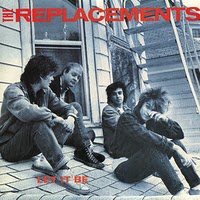 For me this is far and away the best album The Replacements ever made. Some people say that they wish rock and roll was always imbued with the spirit that The Clash brought to it on “London Calling”. I could easily say the same thing about “Let it Be”. This is the perfect synthesis of rock aggression and songwriting finesse. A song like “Androgynous” probably wouldn’t move me so much if it had been more slickly produced. The raw beauty of these songs makes me believe in them. There have been a million songs written about adolescence but “Sixteen Blue” is one of the only ones that really feels like it. The painful yearning and confusion of being sixteen is captured perfectly in those crunching guitar chords and especially the guitar solo with which the song closes. Rather than offering release, the end of the song raises the unresolved tension higher and higher. It is full of beauty and sadness. And then we have the album closer, “Answering Machine”, with its fabulous, tight guitar playing, its earnest, pleading vocal and gorgeous melodicism. This is one of the best songs ever written about romantic obsession. Indeed this is one of the best rock songs period. In its rawness, energy and its dual loyalties to grunge and melody, in 1984 this album sounded like the future itself. –Javasean
For me this is far and away the best album The Replacements ever made. Some people say that they wish rock and roll was always imbued with the spirit that The Clash brought to it on “London Calling”. I could easily say the same thing about “Let it Be”. This is the perfect synthesis of rock aggression and songwriting finesse. A song like “Androgynous” probably wouldn’t move me so much if it had been more slickly produced. The raw beauty of these songs makes me believe in them. There have been a million songs written about adolescence but “Sixteen Blue” is one of the only ones that really feels like it. The painful yearning and confusion of being sixteen is captured perfectly in those crunching guitar chords and especially the guitar solo with which the song closes. Rather than offering release, the end of the song raises the unresolved tension higher and higher. It is full of beauty and sadness. And then we have the album closer, “Answering Machine”, with its fabulous, tight guitar playing, its earnest, pleading vocal and gorgeous melodicism. This is one of the best songs ever written about romantic obsession. Indeed this is one of the best rock songs period. In its rawness, energy and its dual loyalties to grunge and melody, in 1984 this album sounded like the future itself. –Javasean
Blood, Sweat & Tears “Child Is Father to the Man” (1968)
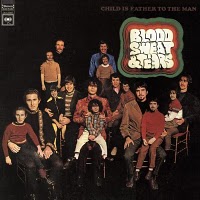 It’s easy to overlook the ubiquitous Blood, Sweat & Tears as their LPs seem to be present in almost every dollar bin in every city. Spend the buck! Their debut is an essential listen and features the unpredictable Al Kooper at the peak of his powers. The music is an eclectic fusion of progressive and psychedelic rock, blues and jazz. There are even elements of lounge music, and occasional orchestration added to the mix. The album features eight originals and four covers. The best covers are Randy Newman’s uplifting Just One Smile and Carole King’s So Much Love which closes the album. Most of the originals were composed by Al Kooper. His bizarre Overture opens, with it’s enticing orchestrated music joined by some manic laughing. Kooper’s I Love You More Than You’ll Ever Know is an excellent jazzed-up blues song and Something Goin’ On is a great jam that was an essential part of late 60s progressive rock. Child Is Father to the Man is an excellent experimental rock album and an important part of any 60s pop collection. –Jim
It’s easy to overlook the ubiquitous Blood, Sweat & Tears as their LPs seem to be present in almost every dollar bin in every city. Spend the buck! Their debut is an essential listen and features the unpredictable Al Kooper at the peak of his powers. The music is an eclectic fusion of progressive and psychedelic rock, blues and jazz. There are even elements of lounge music, and occasional orchestration added to the mix. The album features eight originals and four covers. The best covers are Randy Newman’s uplifting Just One Smile and Carole King’s So Much Love which closes the album. Most of the originals were composed by Al Kooper. His bizarre Overture opens, with it’s enticing orchestrated music joined by some manic laughing. Kooper’s I Love You More Than You’ll Ever Know is an excellent jazzed-up blues song and Something Goin’ On is a great jam that was an essential part of late 60s progressive rock. Child Is Father to the Man is an excellent experimental rock album and an important part of any 60s pop collection. –Jim
Kiss “Kiss” (1974)
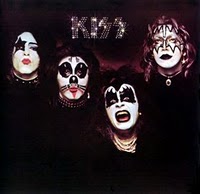 Before the merchandising, neon spandex, and nostalgia circuit, KISS were just another hard rock band with stars in/on their eyes. Kiss, the debut, is loaded with future klassics that display the Stanley/Simmons partnership’s knack for grafting pop hooks to bludgeoning riffs, sporting the likes of “Deuce,” “Strutter,” “Nothin’ to Lose,” and immortal hooker drama “Black Diamond,” a vocal-shy Ace checking in with urban intoxication anthem “Cold Gin,” and an overlooked gem in the simple charm of “Let Me Know.” While the less said about the “Kissin’ Time” cover grafted on to later pressings, the better, and ignoring the fact that a certain sluggishness drags some of these recordings down compared to their Alive! revamps, Kiss remains an auspicious debut. –Ben
Before the merchandising, neon spandex, and nostalgia circuit, KISS were just another hard rock band with stars in/on their eyes. Kiss, the debut, is loaded with future klassics that display the Stanley/Simmons partnership’s knack for grafting pop hooks to bludgeoning riffs, sporting the likes of “Deuce,” “Strutter,” “Nothin’ to Lose,” and immortal hooker drama “Black Diamond,” a vocal-shy Ace checking in with urban intoxication anthem “Cold Gin,” and an overlooked gem in the simple charm of “Let Me Know.” While the less said about the “Kissin’ Time” cover grafted on to later pressings, the better, and ignoring the fact that a certain sluggishness drags some of these recordings down compared to their Alive! revamps, Kiss remains an auspicious debut. –Ben
The Fixx “Reach the Beach” (1983)
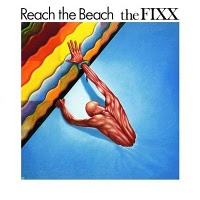 I remember seeing The Fixx on MTV when I was 13, there was always this dark sophistication surrounding them. Their sophomore album, Reach the Beach lives up to those first impressions. This record was quite a success for them with the hits “Saved by Zero”, a complex tune with a hopeless optimism that seems to clash with the melody & “One thing Leads to Another”, an almost dance track about deceit in relationships. The rest of the record follows suit with clean, chorus drenched guitar licks, snappy bass slaps, dissonant keyboards & those wonderful synthesized drums we all loved from the eighties. Cy Curnin’s vocals croon like The Cure’s Robert Smith trying to imitate Duran Duran’s Simon Le Bon, in fact, the music could be described in the same way, new wave funkiness with a sense of melancholy underneath it all- like trying to dance when your sad. Slightly cynical lyrics with upbeat, yet complex arrangements spare this record from being another eighties novelty, the contradictions keep it real. –ECM Tim
I remember seeing The Fixx on MTV when I was 13, there was always this dark sophistication surrounding them. Their sophomore album, Reach the Beach lives up to those first impressions. This record was quite a success for them with the hits “Saved by Zero”, a complex tune with a hopeless optimism that seems to clash with the melody & “One thing Leads to Another”, an almost dance track about deceit in relationships. The rest of the record follows suit with clean, chorus drenched guitar licks, snappy bass slaps, dissonant keyboards & those wonderful synthesized drums we all loved from the eighties. Cy Curnin’s vocals croon like The Cure’s Robert Smith trying to imitate Duran Duran’s Simon Le Bon, in fact, the music could be described in the same way, new wave funkiness with a sense of melancholy underneath it all- like trying to dance when your sad. Slightly cynical lyrics with upbeat, yet complex arrangements spare this record from being another eighties novelty, the contradictions keep it real. –ECM Tim
Repost: 10cc “Sheet Music” (1974)
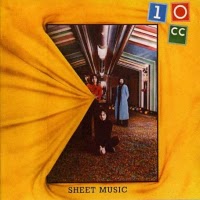 10cc’s “Sheet Music” may be one of my favorite pop albums of all time, lovingly crafted songs, witty, ironic and containing themes still highly relevant even today (“Clockwork Creep” is both funny yet scary when one consideres what the world has had to endure these last few years and “Hotel” nails American Imperialism down with wit and ingenuity), musically this album never fails to surprise taking in 70’s rock (Wall Street Shuffle, Silly Love, Oh Effendi), Calypso (Hotel), Latin Rock (Baron Samedi) and pure pop (The Worst Band In The World, Clockwork Creep), however the two standouts are the most cinematic pieces on the album, “Somewhere In Hollywood” brilliantly send up Hollywood and the star system, whilst “Old Wild Men” looks forward to 10cc’s eventual decline with heart and soul. –Derek
10cc’s “Sheet Music” may be one of my favorite pop albums of all time, lovingly crafted songs, witty, ironic and containing themes still highly relevant even today (“Clockwork Creep” is both funny yet scary when one consideres what the world has had to endure these last few years and “Hotel” nails American Imperialism down with wit and ingenuity), musically this album never fails to surprise taking in 70’s rock (Wall Street Shuffle, Silly Love, Oh Effendi), Calypso (Hotel), Latin Rock (Baron Samedi) and pure pop (The Worst Band In The World, Clockwork Creep), however the two standouts are the most cinematic pieces on the album, “Somewhere In Hollywood” brilliantly send up Hollywood and the star system, whilst “Old Wild Men” looks forward to 10cc’s eventual decline with heart and soul. –Derek
“Sheet Music” is a perennial Jive Time favorite and one of my top ten albums of all time. Fans of Sparks, late Move and early ELO will find things to love here. For those who only know 10cc from their hits; you may be pleasantly surprised when you hear “Sheet Music.” –David
Love “Da Capo” (1966)
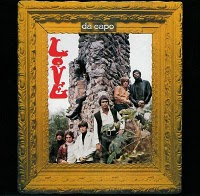 Inhabiting a strange dimension between the Byrds-meets-the-Rolling Stones bluster of their debut LP and the psychedelic mariachi sprawl of Forever Changes, Love’s Da Capo is a transitional album in every sense of the word. Taken together, the six songs that constitute its “Side A Suite” represent some of the best music of the ’60s, making it all the more painful that Side B represents one of its biggest let-downs. On the opening track, “Stephanie Knows Who”, Arthur Lee not only comes into his own, but also establishes himself as one of the most unique and expressive lead vocalists of his generation. There are probably Hallmark cards that are less maudlin and sappy than the MacLean-penned second track, “Orange Skies”, but somehow, miraculously, the band’s tight playing and Lee’s delivery elevate it to greatness. The loungey “¡Que Vida!” is a bit of fluff, but it swings like a Sunset Strip hipster. The mighty “Seven and Seven Is”, one of the few Love songs that ever charted, has been reproduced on garage compilations many times over, but hearing it here in its natural environment reveals what a massive artistic achievement it really is. Loud, fast, and intense, it could only end with the famous nuclear blast of its coda. Thankfully, respite is provided in the form of the acoustic and introspective gem, “The Castle”. Finally comes the mystical masterpiece, “She Comes in Colors”, a song so great that even the Hooters couldn’t ruin it when they covered it almost two decades later. But then there’s the meandering blues-jam, “Revelation”. Taking up that whole flipside and clocking in at almost 20 minutes, it’s perhaps unfairly maligned. On its own merits it’s not terrible, but here it only detracts from the focused brilliance of what came before, and it wears out its welcome quickly. Had wiser council prevailed at Elektra, Da Capo would take its place among such giants such as Are You Experienced?, Piper at the Gates of Dawn, and even its creators’ own definitive artistic statement, Forever Changes. But instead this sophomore effort has to settle for “almost great” status. However, it is still essential. – Richard
Inhabiting a strange dimension between the Byrds-meets-the-Rolling Stones bluster of their debut LP and the psychedelic mariachi sprawl of Forever Changes, Love’s Da Capo is a transitional album in every sense of the word. Taken together, the six songs that constitute its “Side A Suite” represent some of the best music of the ’60s, making it all the more painful that Side B represents one of its biggest let-downs. On the opening track, “Stephanie Knows Who”, Arthur Lee not only comes into his own, but also establishes himself as one of the most unique and expressive lead vocalists of his generation. There are probably Hallmark cards that are less maudlin and sappy than the MacLean-penned second track, “Orange Skies”, but somehow, miraculously, the band’s tight playing and Lee’s delivery elevate it to greatness. The loungey “¡Que Vida!” is a bit of fluff, but it swings like a Sunset Strip hipster. The mighty “Seven and Seven Is”, one of the few Love songs that ever charted, has been reproduced on garage compilations many times over, but hearing it here in its natural environment reveals what a massive artistic achievement it really is. Loud, fast, and intense, it could only end with the famous nuclear blast of its coda. Thankfully, respite is provided in the form of the acoustic and introspective gem, “The Castle”. Finally comes the mystical masterpiece, “She Comes in Colors”, a song so great that even the Hooters couldn’t ruin it when they covered it almost two decades later. But then there’s the meandering blues-jam, “Revelation”. Taking up that whole flipside and clocking in at almost 20 minutes, it’s perhaps unfairly maligned. On its own merits it’s not terrible, but here it only detracts from the focused brilliance of what came before, and it wears out its welcome quickly. Had wiser council prevailed at Elektra, Da Capo would take its place among such giants such as Are You Experienced?, Piper at the Gates of Dawn, and even its creators’ own definitive artistic statement, Forever Changes. But instead this sophomore effort has to settle for “almost great” status. However, it is still essential. – Richard


